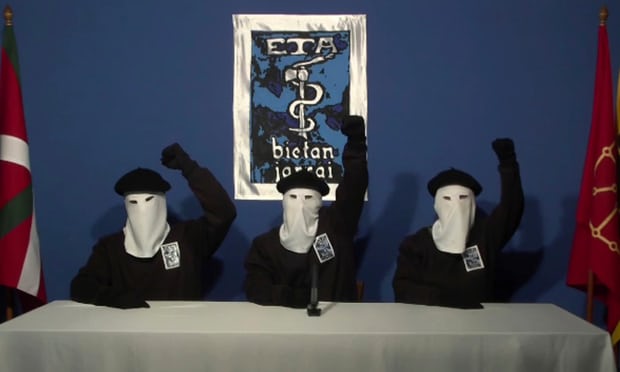In a statement released on Friday morning, the group made a full and unambiguous apology for its actions, accepting that it bore “direct responsibility” for years of bloodshed and misery.
“We know that we caused a lot of pain during that long period of armed struggle, including damage that can never be put right,” it said. “We wish to show our respect for those who were killed or wounded by Eta and those who were affected by the conflict. We are truly sorry.”
The statement also recognised that Eta’s “mistakes or mistaken decisions” had led to the deaths of people who had nothing to do with the conflict, both in the Basque country and beyond.
“We know that, owing to the necessities of all kinds of armed struggle, our actions have hurt people who bore no responsibility whatsoever. We have also caused damage that can’t be undone. We apologise to those people and their families. These words won’t make up for what happened nor will they lessen the pain, but we speak to them respectfully and without wanting to provoke further suffering.”
However, the group also said the suffering of the Basque people had begun before it took up its violent, separatist struggle, citing the bombing of the Basque town of Guernica during the Spanish civil as the root of the region’s enduring pain.
“The generations that came after the bombing of Guernica were the inheritors of that violence and that lament, and it is up to us and the generations that follow us to bring about another future.”
It acknowledged that many people would never see its actions as anything but “unacceptable and unjust” but said the behaviour of Spanish state forces “under the guise of the law” could also be viewed as utterly wrong.
“No one can change the past, but one of the most damaging things we could do now would be to try to distort or hide certain episodes. Let us all recognise our responsibilities and the damage done. Even though we do not have the same point of view or the same feelings, we should all respectfully recognise the suffering endured by others. That is what Eta wants to say.”
The group, which is due to conclude its definitive dissolution within the next few weeks, said the future would have to bring further reconciliation within the Basque country.
“It is a necessary step to accepting the truth in constructive way, closing wounds and building the guarantees to ensure this suffering doesn’t happen again,” said the statement.
Eta also expressed the hope that there would be negotiations over the region’s future, adding: “A democratic solution to the political conflict could yield peace and bring about the freedom of the Basque country.”
A Spanish government statement said the apology was long overdue and hailed it as further proof that “Eta has been defeated with the weapons of democracy and the strength of the rule of law”.
It went on: “It’s good that the terrorist group is apologising to victims because the victims, together with their memories and their dignity, were key to Eta’s defeat.”
The apology was swiftly dismissed by the Association of Victims of Terrorism (AVT), which described it as another attempt by Eta to “dilute its real responsibility, justify its use of violence to impose its totalitarian project and manipulate history”.
The AVT accused the group of trying to use Guernica to justify its murderous deeds, adding: “The only statement we want to hear from Eta is one recognising that it was the chief violator of human rights in the Basque country and the rest of Spain for decades. It should recognise that there is no justification for the use of violence and take a critical look at its criminal past.”
Eta, whose acronym stands for “Basque homeland and freedom”, was founded as a cultural organisation in 1959 when the region was suffering brutal repression under the Franco dictatorship. Its aim was the establishment of an independent Basque state in northern Spain and southern France.
It took up armed struggle the following decade and waged a bloody campaign that finally ended in 2011 when it announced a halt to its violence.
Between 1968 and 2010, it murdered 829 people in bombing and shootings, almost half of them civilians. It also targeted state security forces and in 1973 assassinated the Spanish prime minister Luis Carrero Blanco with a bomb so powerful his car was blown 20 metres into the air.
But the atrocities it committed against civilians eventually turned the tide. The bombing of a Barcelona supermarket in 1987, in which 21 people were killed, provoked revulsion, while the murder of young local politician Miguel Ángel Blanco a decade later brought six million people on to the streets of Spain in protest.
More about: #ETA
















































